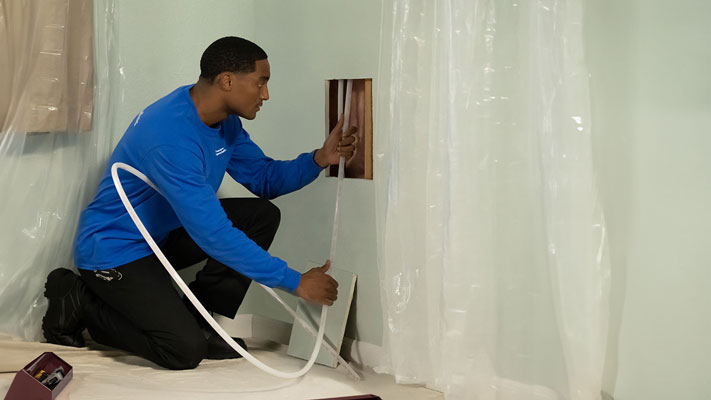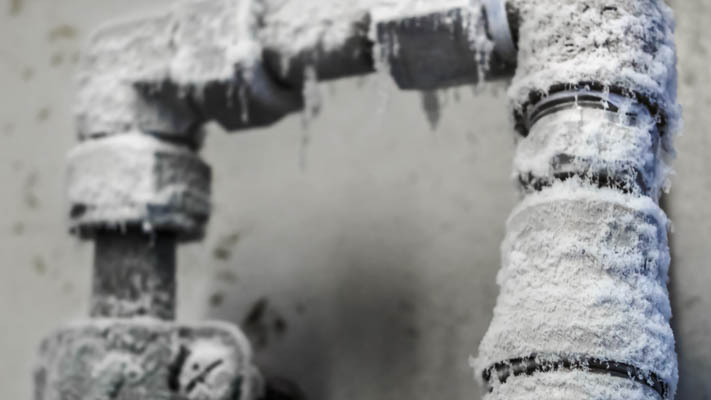How Can You Tell if Pipes Are Frozen?
Recognizing frozen pipes early can help prevent major damage to your home.
The first sign of frozen pipes is often a lack of water flow from faucets. If you turn on a tap and no water comes out, or if the water flow is significantly reduced, a pipe could be frozen. This is especially true for pipes located in unheated areas such as basements, attics, crawl spaces, or exterior walls.

Another indicator is visible frost or ice on the exterior of the pipes. If you notice any part of your plumbing system covered in ice, it's a clear sign that the water inside the pipe may have frozen. Pay attention to outdoor pipes or those in poorly insulated areas, as they are particularly vulnerable.
If you suspect that your pipes have frozen, it's important to act quickly. If left untreated, frozen pipes can burst, leading to water damage, flooding, and costly repairs.
What to Do if Pipes Are Frozen
If your pipes are frozen, the first step is to turn off your home's water supply. This helps prevent further damage if a pipe bursts, though it also means your home will temporarily lose access to water. Once the water supply is shut off, it's crucial to drain all your pipes to ensure no water remains inside to freeze.
The pressure inside a frozen pipe can cause it to crack or rupture, so stopping the water flow as soon as possible is essential. There are several pipe materials particularly prone to freezing temperatures.
The next step is to start thawing the frozen pipe. Here are some ways to do it safely:
- Use a Hair Dryer or Heating Pad: Start by applying gentle heat to the frozen section of the pipe. A hair dryer or heating pad can help slowly warm the pipe and melt the ice inside. Never use an open flame, such as a blowtorch, as this could cause the pipe to burst.
- Increase Room Temperature: If the frozen pipe is located in an unheated area, increasing the room temperature can help thaw it. Open any cabinets under sinks to allow warm air to circulate around the pipes.
- Apply Warm Towels: For pipes that are accessible, you can wrap them in warm, damp towels. This method allows heat to reach the frozen pipe gradually and safely.
If you're unable to thaw the pipes yourself, or if you notice a pipe has burst, it's essential to contact a professional immediately.
Get your free estimate today
With over 75,000 repipes completed, we've perfected our One-Stop Repipe™ for your home.
How to Keep Pipes from Freezing
It is always better to stop pipes from freezing in the first place rather than having to fix already frozen pipes. Here are several effective methods to keep your pipes safe during the cold months:
- Insulate Exposed Pipes: Pipes in unheated areas such as basements, crawl spaces, and attics should be insulated with foam pipe sleeves or heat tape. This will help protect them from freezing temperatures.
- Seal Drafts and Leaks: Cold air can seep through cracks and gaps around windows, doors, and even where pipes enter your home. Sealing these leaks with caulk or spray foam helps prevent cold air from lowering the temperature around your pipes.
- Keep Your Home Warm: Even if you're away for a few days, it's important to maintain a minimum indoor temperature of 55°F (13°C). This can help keep your pipes warm and prevent them from freezing.
- Let Faucets Drip: During extreme cold, let your faucets drip slightly. This keeps water moving through the pipes, which reduces the chances of it freezing. Focus on pipes that run through unheated areas, such as those in exterior walls.
- Drain Outdoor Plumbing: Before winter sets in, disconnect and drain hoses, sprinkler systems, and outdoor faucets. Water left in these fixtures can freeze, expand, and crack pipes.
Although these measures significantly reduce the risk of frozen pipes, they may not guarantee total protection in extreme weather. In cases where temperatures regularly drop below freezing, a more permanent solution—like repiping with freeze-resistant materials—may be necessary.
Repiping with Freeze-Resistant PEX tubing
If you live in an area prone to extreme cold or have an older plumbing system, repiping with freeze-resistant materials like PEX tubing can provide an added layer of protection.

Repiping with PEX ensures that your plumbing system is better suited to withstand extreme weather. During installation, we will ensure that PEX tubing is routed through areas that won't be exposed to freezing temperatures. We have a detailed article about the advantages of PEX tubing over other plumbing materials in freezing temperatures.
If you're concerned about frozen pipes or want to ensure your plumbing system is ready for the cold, contact us today to discuss your PEX repiping options. We'll provide you with a free in-home or remote consultation and help you find the best solution for your home's cold-weather plumbing.
Receive a Free Plumbing Quote for Freeze-Resistant Plumbing
At Repipe Specialists, we've replaced plumbing damaged by freezing temperatures in homes across the USA using Uponor PEX-A tubing. Our customers consistently share positive feedback about their repipe experiences, often noting that we exceed expectations in:
- Speed: Our repipe crews typically complete a repipe in a day, returning on another day for wall patching.
- Convenience: Through our One-Stop Repipe™ Process, we handle everything from permits, to wall patching, to inspections.
- Cleanliness: Our crews are trained to protect your home while working (we cover all surfaces with protective sheeting), and to clean up fully at the end of each day.
- Peace of Mind: Repipe Specialists is a fully licensed plumber in every state we operate in, and we back all of our repipes with a lifetime warranty.
- Financing programs: To help take the sting out of unplanned repipe expenses, we offer several financing programs.
- Price: As a specialist that performs hundreds of repipes a week, we can deliver high quality repipes at a lower cost vs generalist plumbers. Our quotes typically range from $4,500 to $15,000 depending on the size and complexity of your project. We have an article that covers repipe cost factors in detail.
Schedule a free in-home consult, and one of our local repipe consultants will explain all your repipe options and provide you with a written, fixed-price quote. Stop pipes from freezing, repipe with PEX tubing.

